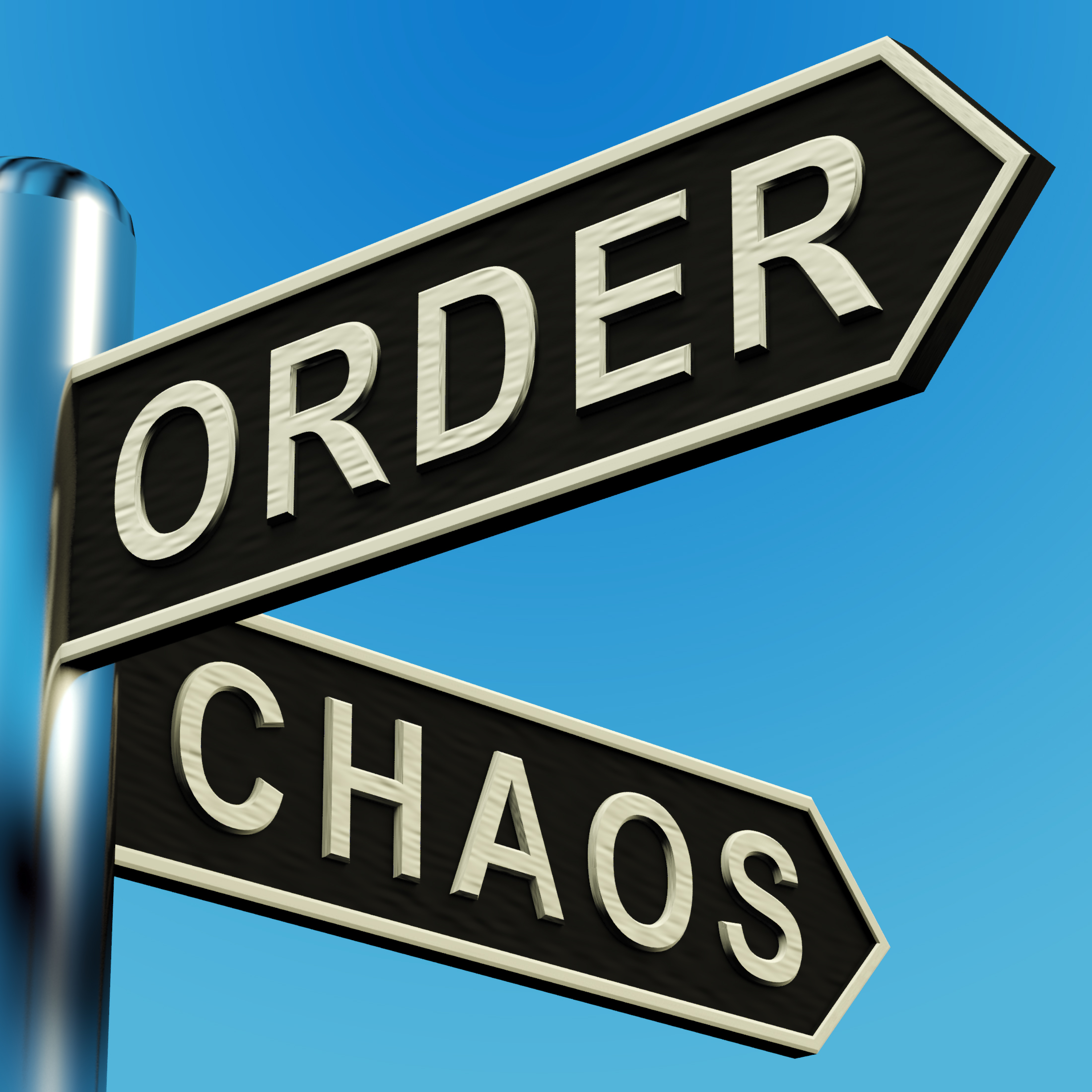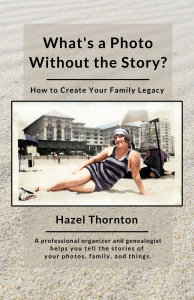Organizing on the Edge of Chaos
 Last week I attended a lecture on Chaos Theory. I’d heard of it before, but didn’t really know what it was, exactly. The lecture was my dad’s idea for something to do together. And it turned out to be really interesting! He said he expected it was going to be about The Butterfly Effect. And it was, but who knew it was also going to be about entropy, the 2nd Law of Thermodynamics, fractals, and Rosa Parks (whose small act of defiance triggered a chain of events resulting in the civil rights movement)?
Last week I attended a lecture on Chaos Theory. I’d heard of it before, but didn’t really know what it was, exactly. The lecture was my dad’s idea for something to do together. And it turned out to be really interesting! He said he expected it was going to be about The Butterfly Effect. And it was, but who knew it was also going to be about entropy, the 2nd Law of Thermodynamics, fractals, and Rosa Parks (whose small act of defiance triggered a chain of events resulting in the civil rights movement)?
 Anyway, the basic premise is that we live in a chaotic world (not to be mistaken for randomness, mind you) and it’s in our nature to try to see patterns in it, and to create order out of it. Also, everything deteriorates over time. (Given an opportunity, concentrated energy spreads out.)
Anyway, the basic premise is that we live in a chaotic world (not to be mistaken for randomness, mind you) and it’s in our nature to try to see patterns in it, and to create order out of it. Also, everything deteriorates over time. (Given an opportunity, concentrated energy spreads out.)
CHAOS is also a cute organizing acronym that stands for Can’t Have Anyone Over Syndrome. I used to feature it on my website until it started attracting potential clients with serious hoarding issues. Not so cute after all. (Are You a Hoarder?)
So, how does Chaos Theory apply to organizing systems?
Regarding the three principle laws of thermodynamics (which involve temperature, energy, entropy, and lots of math), Dennis Overbye, science correspondent for the New York Times, humorously wrote: “Cynics and physics students put it like this: 1. You can’t win. 2. You can’t break even. 3. You can’t get out of the game.”
 Does this mean, given the chaotic nature of things, that getting organized is hopeless?
Does this mean, given the chaotic nature of things, that getting organized is hopeless?
Not at all!
But it does mean, I propose, that we all need to get comfortable living on the edge between chaos and order.
Things fall apart
Getting organized is a process, a mindset, and a habit, not just an event. It’s like living with the idea that we will regularly have to cut our hair, and our grass, if we want to maintain its desired shape.
Here are more examples, along with some related Org4life blog posts:
Your laundry, dishes, paperwork and tasks will multiply, spread out, and become overwhelming if you don’t have systems in place for creating and maintaining order. Also, your organizing systems will only work if you work them.
Six Organizing Systems Everyone Needs — Intro
If you learn how to create S.P.A.C.E. in your life, don’t forget that E = Equalize. This includes The One-In-One-Out Rule (if you buy a new blouse, donate one you never wear anymore) for maintaining the equilibrium of the space.
How to Create More S.P.A.C.E. in Your Life
Don’t Let Your Containers Overflow!
Maintenance requires new habits and mindsets
Things will continue as they are — or deteriorate! — unless something happens to change it, and to maintain that change.
How to Live and Work by Design, not by Default
Do I Practice What I Preach? (habits, maintenance, and backsliding)
The more order you seek, the more frustrating it can be. Example: people who suffer with OCD (Obesessive Compulsive Disorder) seek more order than is considered healthy.
How Clean Does Your House Really Need To Be?
Confessions of a Professional Organizer (I’m organized enough, and not one bit more)
Plans are like fractals, in that they are the on-paper version of the real-world system. Systems don’t always work as anticipated, and even the best system needs tweaking once it has been used for a while. Because things change. In nature (and business, and politics) one must adapt or die. Fortunately, in organizing it’s not usually life or death!
Does Your System Need Tweaking Like Mine Did?
Be the example you seek
Be The Butterfly Effect in your life. Focus on your own self, and your own stuff, and set an example for your kids, your partner, and your community. You never know what small action you take will influence others. Be prepared to not see results right away! Just do what you think is right and don’t give up trying.
10 Ways to Trick your Family into Being Organized
Clutter Counseling: Are You an Odd Couple?
Are you familiar with Chaos Theory?
Can you think of more examples of how it can apply to organizing?
Are you comfortable living on the edge between order and chaos? Or not so much?
Join the conversation by leaving a comment!
—————————————————————————
Copyright 2019 by Hazel Thornton, Organized for Life.
I welcome social media links directly to this page!
Please contact me for other types of reprint permission.
—————————————————————————
Share this:







I think the only exposure I’ve had to chaos theory was Jeff Goldblum in “Jurassic Park.” That said, I agree with all of these neat insights. I love that your Dad thought of this as special time with his daughter:) I do think that the 2nd Law of Thermodynamics definitely is a real thing! It doesn’t take long for things to fall apart when someone isn’t trying diligently to maintain it. Just look at a home that has been abandoned or neglected for a couple of months! Tweaking is also an ongoing process. One of the first questions I ask clients when I come back to their space, “What’s been working, what do we need to tweak?” Fun post, Hazel!
Thanks Seana! I also tell clients, “All organizing projects come down to time management in the end.”
Going to that lecture was such a fun date to have with your Dad! I love that! It’s funny because I just remembered a few days ago about having “special days” or dates with my mom or dad. Sometimes they’d arrange something I’d like, and sometimes I arranged something they’d enjoy. Always memorable, but mostly it was having the one-on-one time with them that I appreciated most. I digress.
As always, you have such an excellent way of connecting the dots. I have heard of the Chaos Theory but didn’t know that much about it. One thing you said that stood out was, “…we all need to get comfortable living on the edge between chaos and order.” The subtitle of my book is “Finding Balance Between Chaos and Perfection.” Chaos is integral to life. Most of us have a deep need to create some amount of order out of that chaos. At the same time we each have varying tolerances for the amount of chaos we can cope with and the amount of order we are comfortable having. And therein lies the tension of life, figuring out that right balance. Often those tolerances vary wilding among household members which can cause additional stress.
Thanks, Linda. Interesting about the subtitle of your book! I think Chaos Theory, although a bit more complicated to understand, is as basic as Gravity. And I agree completely with your last statement!
The science is over my head, but you got me with the part about having to get your hair cut on a regular basis. I may have to steal that when I explain the importance of website maintenance – it may look great when you leave the hairdresser, but it won’t stay healthy and continue to look good indefinitely!
Right? Lawn mowing works, too!
Oh, my! I am definitely living on the edge of chaos, unless this is what drowning in it feels like!
I’m moving in June. So, naturally, I’m starting to sort and pack. I know, for some, that seems like excessively long-range planning but im the only one doing the packing and I intend to pare down my belongings – again.
First I did a bit of Marie Kondo-ing to my clothes and donated the items I hope will bring joy to someone else. Then I sorted and packed my books (a few were donated). Then I sorted my jewelry. I’ve gotten it sorted into bracelets, necklaces, and earrings but , to be honest, I need to go back through that stuff and do some more weeding. Today I pulled down all (most) of my wall art, wrapped it, and stacked it (standing up) in a big box. That task – I’m not feeling like that’s in any kind of order. That’s when I hit the feeling of chaos!
I know there are people who feel like there must be chaos in order to create and grow but I don’t like it! And I don’t like moving but Ive finally admitted that I’m an apartment dweller and that probably means moving more than people who own their homes.
The Entropy